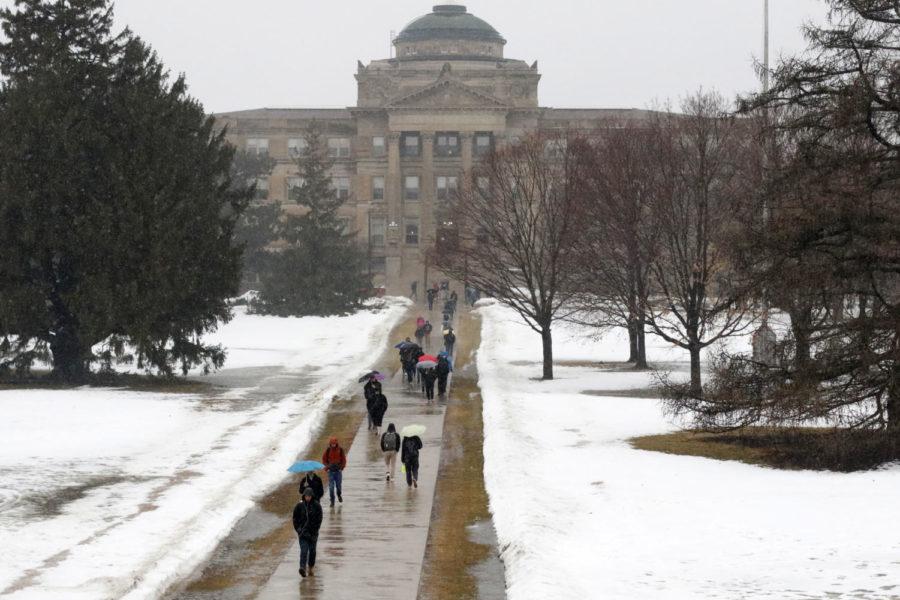Reynolds signs controversial bill regarding religious liberties and free speech on campus
Gillian Holte/Iowa State Daily
Students walk to class in the rain on Mar. 13. Due to the rain and melting snow, Story County was under a flood warning.
March 27, 2019
Gov. Kim Reynolds has signed a “free speech” bill allowing student organizations at Iowa’s public universities to bar members of the LGBTQIA+ community and other identities from leadership positions.
The bill would allow student groups at regent universities to enforce these policies only if it is the genuinely held belief of the group. The legislation passed on a party line vote in the House and a 35-11-3 vote in the Senate.
The controversial portion of the bill, Section 3.3, was at the center of a debate within Student Government, who had originally endorsed the bills passage before many realized the implications of it.
The resolution that passed Student Government did not mention the controversial section. After many student senators were made aware of the section, Student Government rescinded their endorsement as members and allies of the LGBTQIA+ community sat in on the meeting. Some senators, like Sen. Jacob Schrader, who authored the endorsement resolution, were happy the legislation was moving through the state legislature.
“I am personally in favor of the bill in its entirety and I am happy that the Iowa Senate has taken the time to ensure that student’s rights to the freedom of speech and the freedom of association are adequately protected at our public institutions,” Schrader said of the Iowa Senate passage.
One opponent, Iowa State College Democrats President Taylor Blair, was unhappy but “not surprised” that the bill was passed by the Legislature and signed by the governor.
“I just think that it is another sign that the Republicans in Iowa and the party don’t think the LGBT community are valued or are important,” Blair said. “It is clear from some things they have done. Again, this isn’t just about LGBT people. This can apply to religious feelings that have historically been used against black people. This bill affects any group that could be discriminated based on the beliefs of an organization or within a clubs mission.”
Rep. Beth Wessel-Kroeschell, D-Ames, voted no on this legislation as it passed the judiciary committee and voted no again when it was called for a vote in the House.
Wessel-Kroeschell said she has concerns with the section that allows groups to override the nondiscrimination policies of universities and those of the state. However, she said the rest of the bill was fine and she probably would have voted for it otherwise.
This bill is similar in content to one from the previous legislative session that came in the wake of a federal court case between the University of Iowa and a religious student group on its campus.
The federal judge in the case ruled in favor of the group called Business Leaders in Christ, who had prevented a gay member from taking a leadership position in the organization.
The University of Iowa had tried to deregister the student organization for violating a policy by citing, “The University’s Human Rights Policy prohibits student organizations from restricting membership or access to leadership positions on any protected status such as race, national origin, sex, sexual orientation or gender identity,” according to federal court documents.
“This just hurts individuals from the LGBTQ community, any group that has faced discrimination in the past can face discrimination [if the bill becomes law],” Wessel-Kroeschell said.
When asked if student groups would take advantage of discriminatory practices now that the legislation allows it, Blair said he hopes the Iowa State community will uphold the rights of individuals.
“You have already seen it as the University of Iowa, not the bill, but discrimination,” Blair said. “It hasn’t happened here yet, it has at the University of Iowa. Why wouldn’t it happen here?”
If an organization does take advantage of these practices, Student Government Speaker Cody Woodruff said he would advocate for some form of action to be taken and floated the idea of withholding funds from clubs or organizations that exclude certain members from leadership.
“If a student organization starts to discriminate on who can be in their leadership then maybe it is time we as a community need to say that is absolutely not allowed,” Woodruff said. “In terms of what Student Government could do, and this is off the cuff — off the top of my head — you could implement a rule in [Priorities and Criteria] that if a club isn’t open to all members than you could receive no funding.”
Woodruff said he doubts even a small number of clubs would adapt guidelines after the bill was signed, and Blair agreed saying he and his organization would look out for organizations taking in these policies.
“Absolutely, we are going to be vigilant,” Blair said. “Regardless of if it is legal now, there are lots of things that are legal that we should not support. Hate speech is technically legal, but that does not mean we should support it. Just because this law says you can discriminate does not mean it reflects the Iowa State Community, and, in fact, I think it goes the opposite direction of what our community stands for.”
Reporting contributed by Jake Webster.







